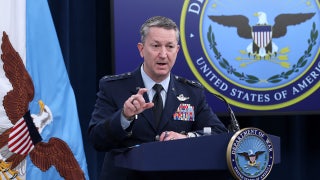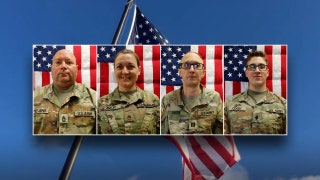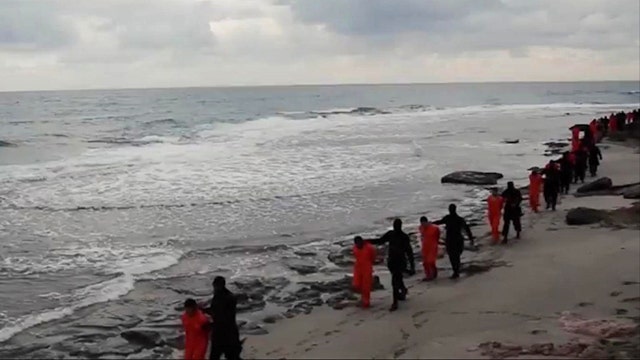In a reminder that relations with Egypt have remained strained since the overthrow of President Mohammed Morsi, the Pentagon said Wednesday it was not given any advance warning by the Egyptian air force before it conducted airstrikes against ISIS training camps in eastern Libya Monday.
“We weren't notified ahead of time. We didn't participate or support them in any way, and we're not taking a position on it,” Rear Admiral John Kirby said during a Pentagon briefing.
Egypt flew U.S.-made F-16 fighter jets when it dropped bombs on ISIS training camps near Derna, in response to the beheading of 21 Egyptian Coptic Christians on the shores of Tripoli.
Yet, the U.S., which has provided Egypt with $1.5 billion a year in mostly military aid since the Camp David Peace Accords were signed in 1978, wasn’t notified.
"It's a complex relationship that we have with Egypt,” Kirby told reporters.
It’s so complex that Egypt does not fly as part of the 12-nation anti-ISIS coalition countering ISIS in Iraq and Syria, making it until now a nominal member of the 60-nation, anti-ISIS coalition.
Relations with the world’s largest Arab country have been strained since the State Department’s perceived embrace of the Muslim Brotherhood after its leader, Mohammed Morsi, was elected president in 2012.
When Egypt’s military overthrew the Morsi government and General Abdel Fatah Al Sisi became president, the State Department tried to avoid calling it a “coup” to avoid automatic funding cuts.
Some high profile weapons shipments have been halted to Cairo ever since, including a shipment of four F-16 fighter jets and spare parts that Cairo has requested since July, part of a larger deal reached in 2009 for 20 F-16s.
The White House wanted to send a message to the military-led government of Al Sisi. The message was delivered by then Defense Secretary Chuck Hagel, who was made the point man to corral the new Egyptian leadership, which included Egypt’s top generals.
The U.S. canceled its biannual military exercises known as Operation Bright Star in 2013 in response to the Egyptian military’s crackdown on Islamist groups at home.
“What can I tell you is we are continuing to review the security assistance policy in light of developments -- developments inside Egypt,” Kirby told reporters Wednesday. “So we are still holding -- currently holding on the delivery of several weapon systems, to include the F-16s, the --the M1A1 tanks and -- and some other things, like Harpoon missiles. Those are still on -- on hold, and there's been no decision with respect to that.”
In December the Pentagon delivered a stalled shipment of 10 Apache helicopters to Egypt as Cairo tried to fend off a rising Al Qaeda-linked element carrying out attacks against its soldiers in the Sinai.
Earlier this month, Al Sisi signed a $5.9 billion deal with France to purchase 24 French fighter jets made by Rafale. France agreed to cover the expense should Cairo default.
The signing ceremony was held in Cairo on February 16 – the same day Egypt carried out its unilateral airstrikes in Libya without informing the U.S.
Sensing the strain between the U.S. and its long-time ally, Russia also attempted to move in and fill the void. Russia's President Vladimir Putin flew to Cairo on February 9 to meet with Al Sisi as President Obama hosted German Chancellor Angela Merkel in Washington to discuss options to counter Russian advances in Ukraine.
The symbolism was clear: Al Sisi wanted to show that he has other options and is not dependent on the U.S. military.
The State Department spokesman Wednesday was reluctant to confirm from the podium that Egypt carried out the airstrikes against ISIS training camps.
“We do believe a political solution, one that's led by the U.N., is the best path forward,” State Department spokeswoman Jen Psaki told reporters Wednesday.
Cairo has requested that the U.N. lift the arms embargo in Libya so that weapons can be provided to the internationally recognized government, which is currently fighting other Islamist factions and now ISIS.
Egypt has requested a U.N.-backed coalition to fight ISIS in Libya, but for now the Pentagon and the U.S. Africa Command do not intend to intervene militarily.
At the U.N. Wednesday, the Special Envoy to Libya, Bernardino Leon, warned, “The Islamic State has found fertile ground in Libya,” as he addressed the Security Council at an emergency session on Libya and ISIS.
In December, Lt Gen David Rodriguez, the general in charge of the U.S. Africa Command, warned that ISIS had set up training camps in eastern Libya.













































